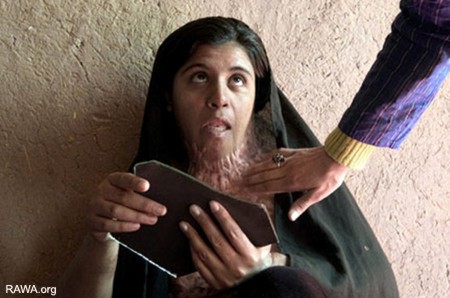Mandy Clark
Greater freedom for the women of Afghanistan was one of the promises of the 2001 U.S.-led invasion. U.S. and Afghan officials say there have been significant improvements, noting that some two million women and girls are now attending school, something that was forbidden under the extremist Taliban government. But despite Western efforts, many Afghan women say their lives have not improved significantly and an increasing number of women are committing suicide by burning themselves to death as a way to escape physical, sexual and psychological abuse. Mandy Clark reports from Kabul.

October 22, 2004: Zarah, 19-years-old, shows scars that she suffered when she set fire to herself at the climax of an argument with her husband only three months into their marriage in Herat, Afghanistan. (Photo by Paula Bronstein)
More Photos
Badly burnt and barely alive in a shabby Kabul hospital, a 15 year old girl lies in agony. The burn unit surgeon, Dr. Sarwani Sahab says these types of injuries are becoming more common among young Afghan women.
"In Afghanistan, young girls, maybe from 18 to 35, is a big problem for self-burning here," said Dr. Sahab.
The girl is from Kandahar province and insists she was burnt by a lantern but doctors believe it was a failed suicide attempt. They say her chance of survival is 50-50.
This young girl's story is becoming increasingly common. An Afghan women rights group say that last year, almost 500 women chose death or disfigurement to a life of despair by setting themselves on fire to escape forced marriages, slavery or sexual and other types of abuse. For those who live through this form of suicide attempt, the scarring can be a death sentence in itself.
The survivors who leave this ward cannot return home because of the shame they brought on their family. Some will live the rest of their lives on the streets or if they're lucky, they may find a safe house.
There are other women who brave the wrath of society and try to help these young burn victims. Many risk their own lives to do so.
Political activist, Malalai Joya is one of them and agreed to speak with VOA. She was elected as a member of the Afghan parliament in 2005 but was kicked out of government. She says it was because of her views. Security around Joya is tight, it has to be; she has survived four assassination attempts because of her fight for women's rights.
"They burn themselves in many cases because they prefer to die than have this hell life," Joya. "It is so sad for me, it is impossible, I cannot find the words to show, to express my suffer, my sadness."
But her work is having an impact.
Razia is another burn victim. Razia gives only her first name. She says her failed suicide bid bought her freedom.
She tells how a warlord from her village threatened to kill her if she did not allow him to marry her 13-year-old daughter. As a war widow, she had no one to protect her. Razia says she hoped if she died, an orphanage would take in her children. But she survived. A women's group found her in the hospital and offered her and her children a safe house.
She says she was dead at that time, but God gave her a new life.
Afghan officials are quick to point out that women now do have greater freedom and opportunities since the fall of the extremist Taliban regime. They say some two million women and girls are now getting an education - something that was forbidden under the Taliban.
But, women's rights advocate Palwasha Hassan says not enough work has been done to help Afghan women. However, she says people should not lose heart.
"I think we cannot lose this opportunity and say 'ok, in Afghanistan nothing can be changed because we have a traditional system and this and that.' You have to start from where you can so if this is the opportunity, it should not be missed," said Hassan.
Abuse against women and suicide attempts to escape it are all too frequent problems in the strict traditional societies of South Asia and the Middle East. But, in Afghanistan, the ouster of the Taliban regime was supposed to change that. Many Afghan women are still waiting for that to happen.



